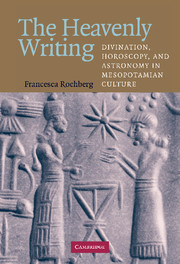Book contents
- Frontmatter
- Contents
- Preface
- Acknowledgments
- Abbreviations
- Chronological References and Akkadian and Astronomical Terminology
- The Heavenly Writing
- Prologue
- 1 The Historiography of Mesopotamian Science
- 2 Celestial Divination in Context
- 3 Personal Celestial Divination: The Babylonian Horoscopes
- 4 Sources for Horoscopes in Astronomical Texts
- 5 Sources for Horoscopes in the Early Astrological Tradition
- 6 The Scribes and Scholars of Mesopotamian Celestial Science
- 7 The Classification of Mesopotamian Celestial Inquiry as Science
- Epilogue
- Bibliography
- Name Index
- Subject Index
5 - Sources for Horoscopes in the Early Astrological Tradition
Published online by Cambridge University Press: 08 January 2010
- Frontmatter
- Contents
- Preface
- Acknowledgments
- Abbreviations
- Chronological References and Akkadian and Astronomical Terminology
- The Heavenly Writing
- Prologue
- 1 The Historiography of Mesopotamian Science
- 2 Celestial Divination in Context
- 3 Personal Celestial Divination: The Babylonian Horoscopes
- 4 Sources for Horoscopes in Astronomical Texts
- 5 Sources for Horoscopes in the Early Astrological Tradition
- 6 The Scribes and Scholars of Mesopotamian Celestial Science
- 7 The Classification of Mesopotamian Celestial Inquiry as Science
- Epilogue
- Bibliography
- Name Index
- Subject Index
Summary
THE IDEOLOGICAL BACKGROUND
In the preceding chapter, parallels found within the contents of horoscopes and a variety of astronomical sources establish links between the modern categories of astronomical and astrological classes of texts in the scribes' repertoire. The horoscopes therefore uncover interrelations among celestial scientific texts and raise the question of the integrated nature of Babylonian celestial science in general. The place of horoscopy in the context of other Late Babylonian astronomical texts is secured by comparison with the content of those astronomical texts, but what of the relationship of horoscopes to other “astrological” genres, particularly celestial omens? An account of the data presented in horoscopes in light of traditional celestial omens has been undertaken in Chapter 3. But the historical question, whence the foundations for Babylonian horoscopy, cannot be answered solely by the identification of textual antecedents, either astronomical or astrological, but must also consider the ideological dimension as well.
We turn our attention then to the relation of the new genethlialogy to earlier celestial omens, from the perspectives of the meaning and authority of celestial signs, and the relation between the individual and the divine cosmos. Always a matter of translation and inference, we are sharply limited by our ability to penetrate to the underlying ideologies of our texts concerning the physical universe, why and how the phenomena constituted “signs,” and the relationship between humankind and the gods.
- Type
- Chapter
- Information
- The Heavenly WritingDivination, Horoscopy, and Astronomy in Mesopotamian Culture, pp. 164 - 208Publisher: Cambridge University PressPrint publication year: 2004

